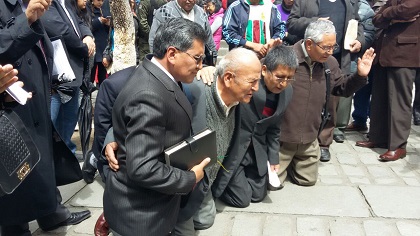The new Penal Code to be approved under President Evo Morales sanctions religious “recruitment” with 7 to 12 years of imprisonment.
Evangelical churches in Bolivia have reacted to what could be the end of religious freedom in the country.
The new Penal Code includes an article to stop the activities of both criminal groups and religious organisations.
Specifically, Article 88.11 reads: “Whoever recruits, transports, deprives of freedom or hosts people with the aim of recruiting them to take part in armed conflicts or religious or worship organizations will be penalised 7 to 12 years of imprisonment”.
A rigorous application of the Penal Code, Christians in Bolivia are saying, could ban preaching in the streets and the sole action of inviting someone to a Christian event.
The new Penal Code would silence the around 2 million evangelical Christians representing approximately 19% of the total population. The legislation would affect other religious groups as well, such as Roman Catholics.
The plans of President Evo Morales collide with the Bolivian Constitution when it comes to liberties. The Article 4 of the basic law says: “The State respects and guarantees the freedom of religion and spiritual beliefs, according to their worldviews. The State is independent of religion”.
EVANGELICALS: NO LONGER ALLOWED TO PREACH THE GOSPEL?
Evangelical representatives are analysing the consequences the new legislation could have on churches.
Several pastors gathered outside the Bolivian national parliament in La Paz to pray for religious freedom.
 Evangelical pastors in La Paz prayed in front of the national Assembly. / La Razón
Evangelical pastors in La Paz prayed in front of the national Assembly. / La Razón“Will they denounce us if we bring a group of people to a Christian camp? Will I no longer be able to preach the Gospel on the streets?”, pastor Miguel Machaca Monroy, President of the coalition of evangelical churches in the capital city asked.
The National Association of Evangelicals in Bolivia also criticised the new Penal Code. “It is deplorable that Bolivia becomes the first Latin American country to persecute the rights of freedom of conscience and of religion, which are protected by the Universal Declaration of Human Rights, the declaration of San José de Costa Rica, and our Constitution”.
“Christian evangelical churches in our country are institutions aiming to rehabilitate the human being, improve the moral, spiritual, ethical and social conditions of our citizens”, the evangelical representatives said. “Now, we have been put in a situation in which practising the Gospel has been criminalised”.
Faith groups are not the only ones that are opposing the plans of the government. Journalists have also denounced the Penal Code because it will severely restrict freedom of speech and the freedom of media.

Las opiniones vertidas por nuestros colaboradores se realizan a nivel personal, pudiendo coincidir o no con la postura de la dirección de Protestante Digital.
Si quieres comentar o